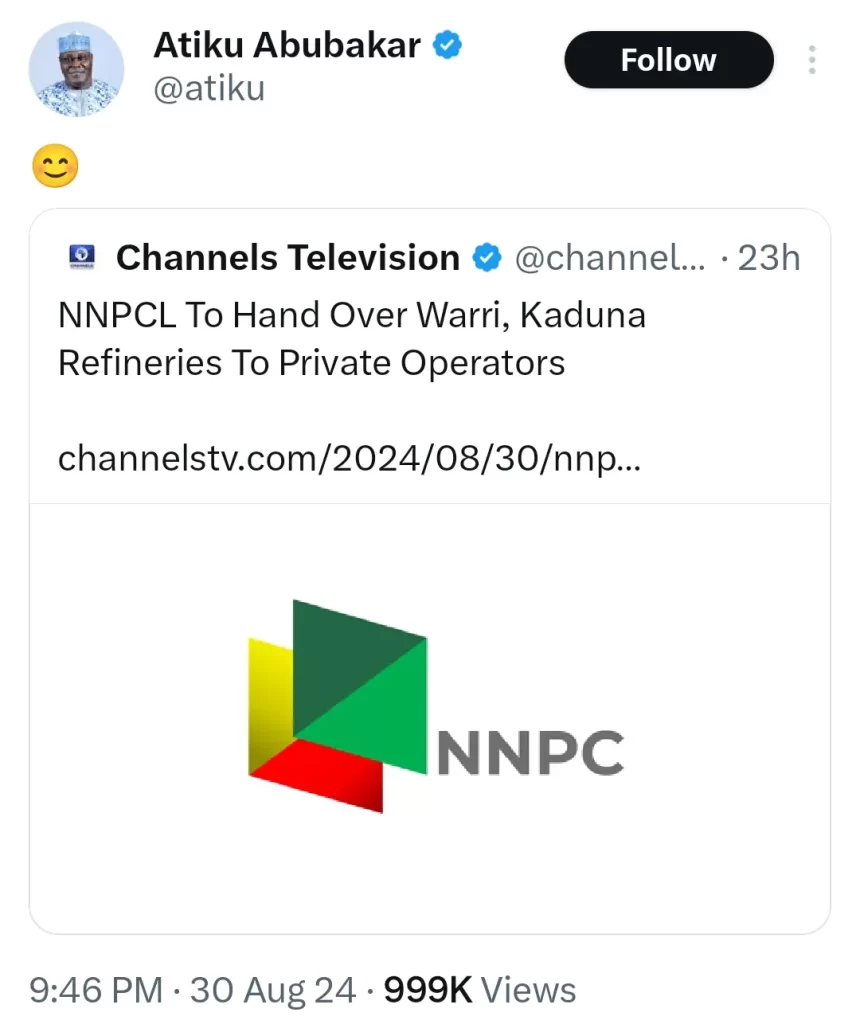Former Vice President Atiku Abubakar has laughed at the Nigerian National Petroleum Company Limited (NNPC) handing over Warri and Kaduna Refineries to private operators.
Atiku made the laughing gesture via an emoji while reacting to the news headline shared by Channels TV on X (formerly Twitter) on Friday night.
— Atiku Abubakar (@atiku) August 30, 2024

Recall that Atiku, who has been contesting to be president of Nigeria for a while now in one of his campaigns, called for the privatisation of NNPC and other government-owned establishments.
He was mocked and even called a “Thief” by the ruling All Progressives Congress (APC) including the now President Bola Tinubu and other Nigerians.

CONVERSEER reports that the NNPC in a post on X on Friday called for the expression of interest (EOI) “For the Provision of Operations and Maintenance (O&M) Services for NNPC Limited Refineries (Combined Tender): Warri Refining and Petrochemical Company (WRPC), and Kaduna Refining and Petrochemical Company (KRPC).”
EXPRESSION OF INTEREST (EOI)
For the Provision of Operations and Maintenance (O&M) Services for NNPC Limited Refineries (Combined Tender): Warri Refining and Petrochemical Company (WRPC), and Kaduna Refining and Petrochemical Company (KRPC).#EnergyForToday #EnergyForTomorrow pic.twitter.com/tJSB5Z8dqq
— NNPC Limited (@nnpclimited) August 29, 2024
Recall that the Warri Refinery, located at Warri in Delta State and commissioned in 1978, is a complex conversion refinery with a nameplate distillation capacity of 6,250,000 MTA (125,000 bpd).
The refinery complex includes a petrochemical plant commissioned in 1988 with production capacities of 13,000 MTA of polypropylene and 18,000 MTA of carbon black. The refinery is meant to supply markets in the south and southwest regions of Nigeria.
On the other hand, the Kaduna refinery was commissioned in 1980 to supply petroleum products to Northern Nigeria with a capacity of 50,000 B/D.
In 1983, the capacity was expanded to 100,000 B/D by adding a second 50,000 B/D crude train dedicated to the production of lubricating oils (lubes).
In 1986, the capacity of the first crude train was expanded to 60,000 B/D. The expansions have increased the current nameplate capacity of the refinery to 110,000 B/D.
READ ALSO:






